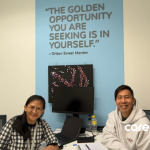If you’ve ever experienced a long job search, you would know how draining it can be. While job-hunting, one’s savings depletes, one’s confidence takes a hit, all while facing a future that remains uncertain.
Job-hunting over a long period of time is especially tough for the unemployed. The stress of being able to provide for their family could take a toll on their overall health. Some individuals may even feel embarrassed or afraid to tell others about their predicament and choose to distance themselves from their friends and loved ones.
Don’t lose hope. If you find yourself in a rut after hunting for a job for months or even years, here’s a handy checklist to help you stay on track. Career matching professionals from AKG (formerly known as Maximus) and Ingeus, career matching providers under Workforce Singapore, also share their advice.
- Do I need to pick up new skills?
- Do I have the right mindset?
- Should I ask for help?
Do I need to pick up new skills?
If you’re spending a lot of time editing your resume, writing cover letters, or scrolling through job listings, ask yourself if some of that time should be used to hone your skills instead. According to Wilson Chia, an Employer Engagement Manager at AKG, it is important for those who are unemployed for over two years to pick up skills and stay plugged into the industry’s market conditions.
Felicia Wee, an experienced career coach with Ingeus, also adds that it can take close to three months to re-equip themselves with the necessary skills.
“In terms of soft skills, being clear, concise and focused will help in both appealing to hiring managers and human resource departments for the companies you want to join. Hard-skills wise, try to upskill in your targeted career direction, and perhaps take on pro-bono or short-term work projects,” she elaborates
Do I have the right mindset?
Job-hunting over a long period of time can be stressful, so it’s important to have the right mindset to support you.
You can bring more positivity and motivation to your job search by adopting a growth mindset; seeing challenges as opportunities to improve.
The long-term unemployed, especially those facing a career switch, can also struggle with mindset issues. Wilson shares that perceptions of being too old or overqualified can hold LTUs back from moving toward a successful job search.
On the other hand, being overly desperate to take the next job that comes along can also be a challenge, says Jesmin Tan, a Programme Manager at AKG.
“It is important to make a career decision not based on impulse, but on the basis of what can be aligned to your short and medium-term personal and career aspirations,” she shares.
Should I ask for help?
In a society that values independence, it’s hard to imagine asking for help as an option. This is especially true with job-hunting, which can feel like a personal affair.
However, asking for help, especially after many months of job-hunting, can help give you the boost you need. This could include tapping into your network for job opportunities or asking a friend to read through your resume.
If you prefer to have an independent and professional take, you have options as well. Seeking advice from career guides and coaches could help improve your job hunt, spotting areas of improvement that you could work on. WSG’s Career Matching Services can also help you navigate career transitions and match you to the right jobs. Use our checklist to help you in your job hunt and good luck to you!
“A career coach’s understanding of the recruitment and selection processes involved in the marketplace, as well as of different functional types and vertical industries, will help provide useful market knowledge for jobseekers to understand what their career possibilities are,” says Jesmin.
Want to learn more about what a career coach does? We ask Jesmin some questions about how she helps jobseekers.
















